Telstra's CSR in Australia: Challenges, Analysis & Government Impact
VerifiedAdded on 2023/06/14
|6
|1317
|344
Report
AI Summary
This report provides an analysis of Corporate Social Responsibility (CSR) within Telstra Corporation, Australia, examining the challenges faced in implementing CSR initiatives, including lack of societal participation, transparency issues, and supplier relations. It evaluates Telstra's CSR activities, such as their response to the Indian tsunami disaster, while also highlighting areas where more contribution is needed, particularly in adapting to technological changes. The report also discusses the role of government policies and the importance of stakeholder engagement in overcoming CSR challenges, with an emphasis on using stakeholder theory to balance the needs of shareholders and society. Desklib provides access to similar solved assignments and study resources for students.
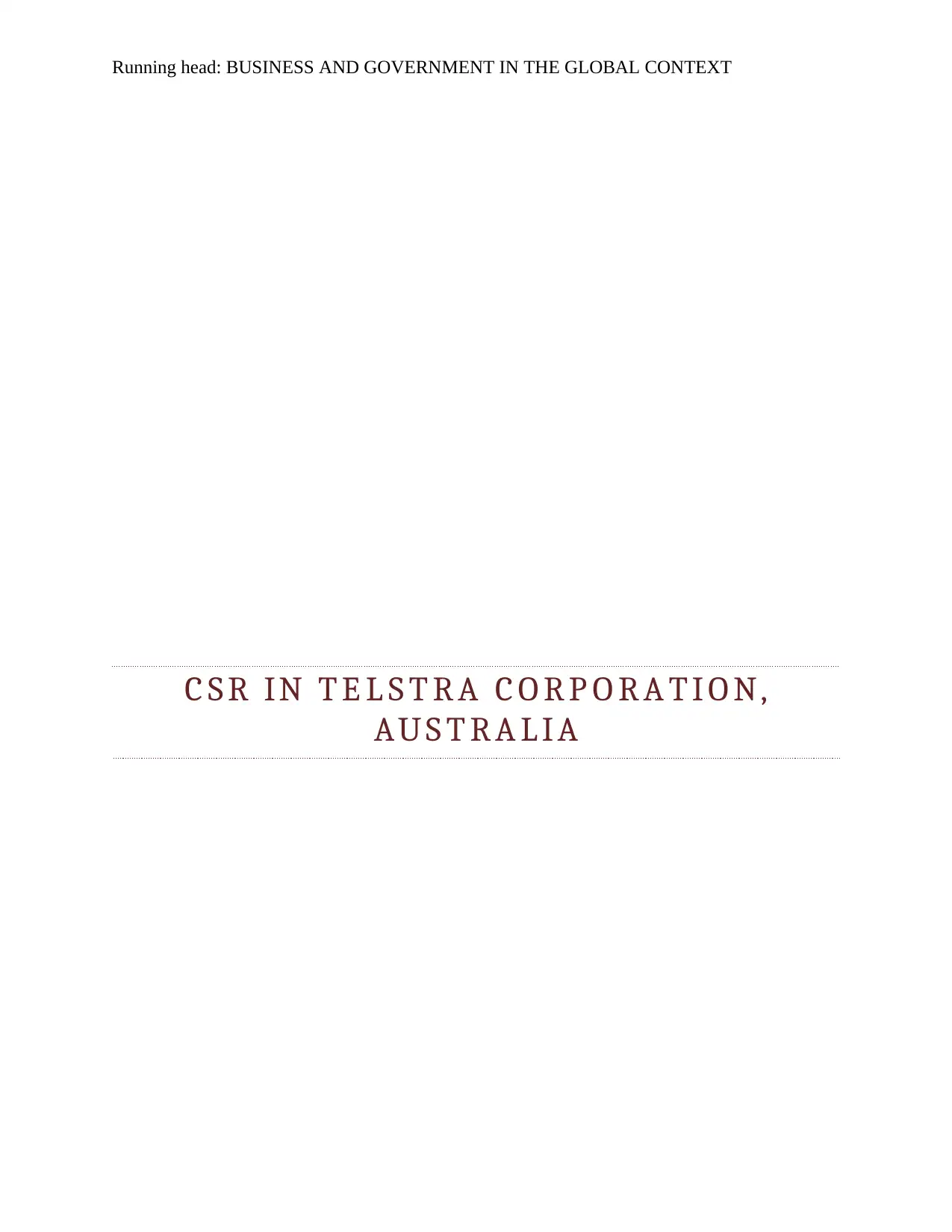
Running head: BUSINESS AND GOVERNMENT IN THE GLOBAL CONTEXT
C S R I N T E L S T R A C O R P O R A T I O N ,
A U S T R A L I A
C S R I N T E L S T R A C O R P O R A T I O N ,
A U S T R A L I A
Paraphrase This Document
Need a fresh take? Get an instant paraphrase of this document with our AI Paraphraser
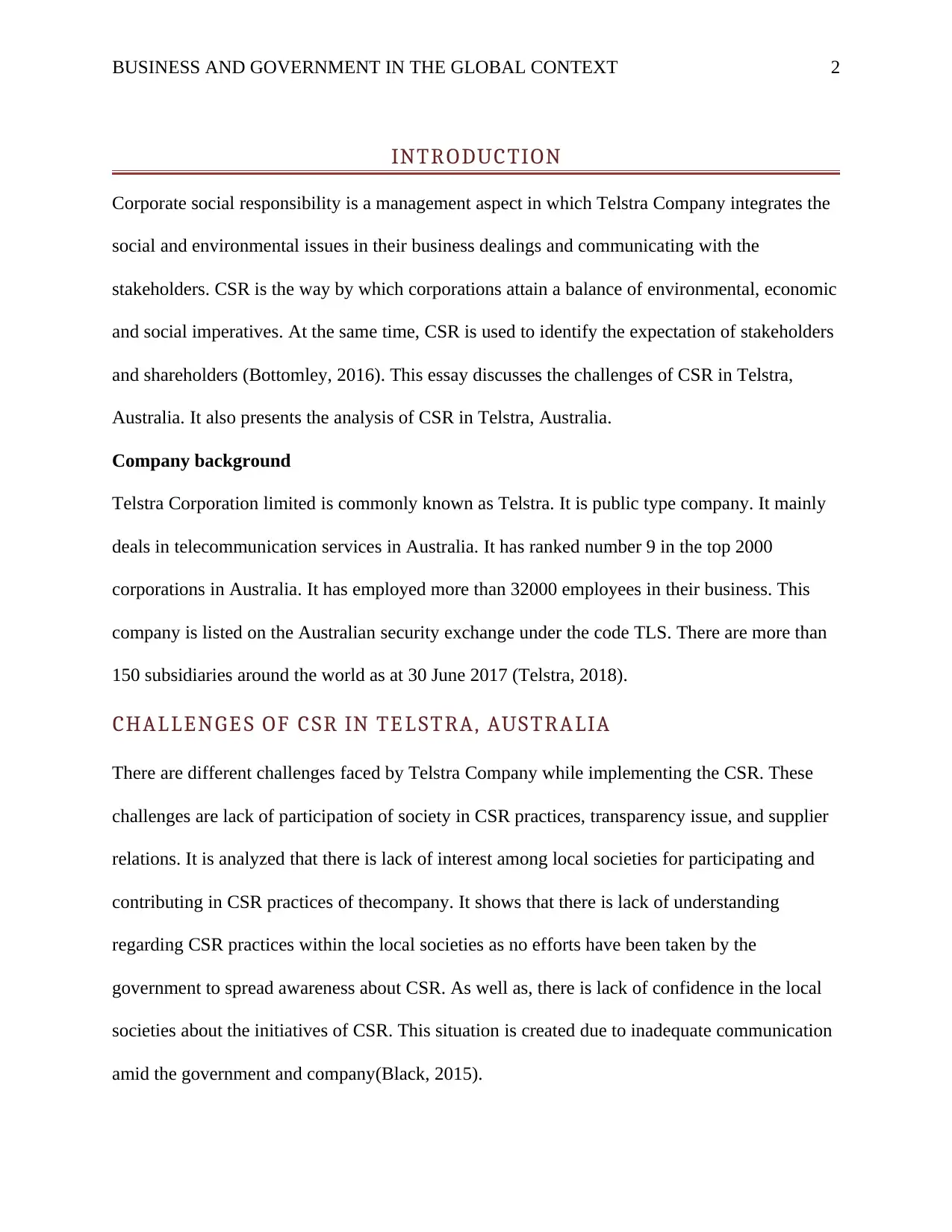
BUSINESS AND GOVERNMENT IN THE GLOBAL CONTEXT 2
INTRODUCTION
Corporate social responsibility is a management aspect in which Telstra Company integrates the
social and environmental issues in their business dealings and communicating with the
stakeholders. CSR is the way by which corporations attain a balance of environmental, economic
and social imperatives. At the same time, CSR is used to identify the expectation of stakeholders
and shareholders (Bottomley, 2016). This essay discusses the challenges of CSR in Telstra,
Australia. It also presents the analysis of CSR in Telstra, Australia.
Company background
Telstra Corporation limited is commonly known as Telstra. It is public type company. It mainly
deals in telecommunication services in Australia. It has ranked number 9 in the top 2000
corporations in Australia. It has employed more than 32000 employees in their business. This
company is listed on the Australian security exchange under the code TLS. There are more than
150 subsidiaries around the world as at 30 June 2017 (Telstra, 2018).
CHALLENGES OF CSR IN TELSTRA, AUSTRALIA
There are different challenges faced by Telstra Company while implementing the CSR. These
challenges are lack of participation of society in CSR practices, transparency issue, and supplier
relations. It is analyzed that there is lack of interest among local societies for participating and
contributing in CSR practices of thecompany. It shows that there is lack of understanding
regarding CSR practices within the local societies as no efforts have been taken by the
government to spread awareness about CSR. As well as, there is lack of confidence in the local
societies about the initiatives of CSR. This situation is created due to inadequate communication
amid the government and company(Black, 2015).
INTRODUCTION
Corporate social responsibility is a management aspect in which Telstra Company integrates the
social and environmental issues in their business dealings and communicating with the
stakeholders. CSR is the way by which corporations attain a balance of environmental, economic
and social imperatives. At the same time, CSR is used to identify the expectation of stakeholders
and shareholders (Bottomley, 2016). This essay discusses the challenges of CSR in Telstra,
Australia. It also presents the analysis of CSR in Telstra, Australia.
Company background
Telstra Corporation limited is commonly known as Telstra. It is public type company. It mainly
deals in telecommunication services in Australia. It has ranked number 9 in the top 2000
corporations in Australia. It has employed more than 32000 employees in their business. This
company is listed on the Australian security exchange under the code TLS. There are more than
150 subsidiaries around the world as at 30 June 2017 (Telstra, 2018).
CHALLENGES OF CSR IN TELSTRA, AUSTRALIA
There are different challenges faced by Telstra Company while implementing the CSR. These
challenges are lack of participation of society in CSR practices, transparency issue, and supplier
relations. It is analyzed that there is lack of interest among local societies for participating and
contributing in CSR practices of thecompany. It shows that there is lack of understanding
regarding CSR practices within the local societies as no efforts have been taken by the
government to spread awareness about CSR. As well as, there is lack of confidence in the local
societies about the initiatives of CSR. This situation is created due to inadequate communication
amid the government and company(Black, 2015).
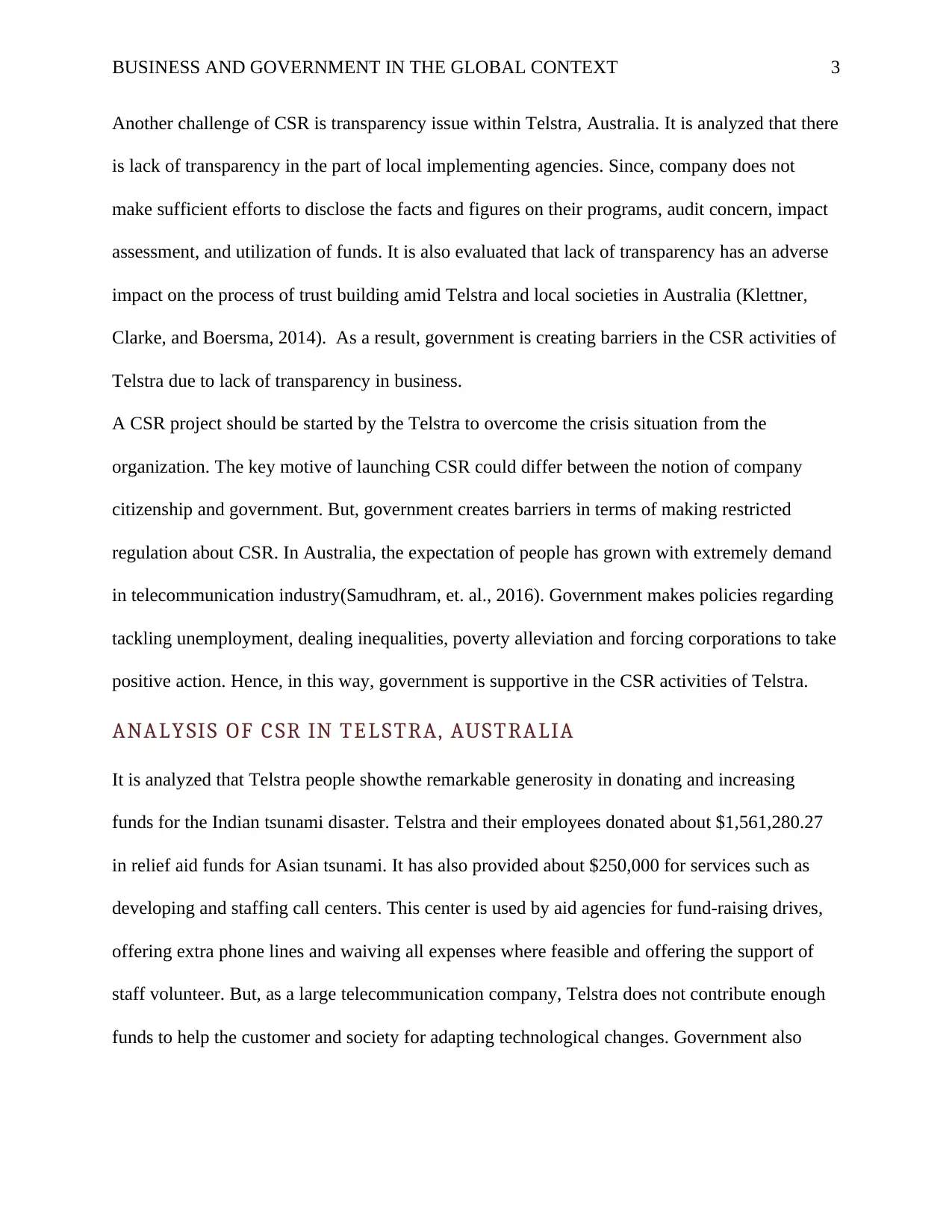
BUSINESS AND GOVERNMENT IN THE GLOBAL CONTEXT 3
Another challenge of CSR is transparency issue within Telstra, Australia. It is analyzed that there
is lack of transparency in the part of local implementing agencies. Since, company does not
make sufficient efforts to disclose the facts and figures on their programs, audit concern, impact
assessment, and utilization of funds. It is also evaluated that lack of transparency has an adverse
impact on the process of trust building amid Telstra and local societies in Australia (Klettner,
Clarke, and Boersma, 2014). As a result, government is creating barriers in the CSR activities of
Telstra due to lack of transparency in business.
A CSR project should be started by the Telstra to overcome the crisis situation from the
organization. The key motive of launching CSR could differ between the notion of company
citizenship and government. But, government creates barriers in terms of making restricted
regulation about CSR. In Australia, the expectation of people has grown with extremely demand
in telecommunication industry(Samudhram, et. al., 2016). Government makes policies regarding
tackling unemployment, dealing inequalities, poverty alleviation and forcing corporations to take
positive action. Hence, in this way, government is supportive in the CSR activities of Telstra.
ANALYSIS OF CSR IN TELSTRA, AUSTRALIA
It is analyzed that Telstra people showthe remarkable generosity in donating and increasing
funds for the Indian tsunami disaster. Telstra and their employees donated about $1,561,280.27
in relief aid funds for Asian tsunami. It has also provided about $250,000 for services such as
developing and staffing call centers. This center is used by aid agencies for fund-raising drives,
offering extra phone lines and waiving all expenses where feasible and offering the support of
staff volunteer. But, as a large telecommunication company, Telstra does not contribute enough
funds to help the customer and society for adapting technological changes. Government also
Another challenge of CSR is transparency issue within Telstra, Australia. It is analyzed that there
is lack of transparency in the part of local implementing agencies. Since, company does not
make sufficient efforts to disclose the facts and figures on their programs, audit concern, impact
assessment, and utilization of funds. It is also evaluated that lack of transparency has an adverse
impact on the process of trust building amid Telstra and local societies in Australia (Klettner,
Clarke, and Boersma, 2014). As a result, government is creating barriers in the CSR activities of
Telstra due to lack of transparency in business.
A CSR project should be started by the Telstra to overcome the crisis situation from the
organization. The key motive of launching CSR could differ between the notion of company
citizenship and government. But, government creates barriers in terms of making restricted
regulation about CSR. In Australia, the expectation of people has grown with extremely demand
in telecommunication industry(Samudhram, et. al., 2016). Government makes policies regarding
tackling unemployment, dealing inequalities, poverty alleviation and forcing corporations to take
positive action. Hence, in this way, government is supportive in the CSR activities of Telstra.
ANALYSIS OF CSR IN TELSTRA, AUSTRALIA
It is analyzed that Telstra people showthe remarkable generosity in donating and increasing
funds for the Indian tsunami disaster. Telstra and their employees donated about $1,561,280.27
in relief aid funds for Asian tsunami. It has also provided about $250,000 for services such as
developing and staffing call centers. This center is used by aid agencies for fund-raising drives,
offering extra phone lines and waiving all expenses where feasible and offering the support of
staff volunteer. But, as a large telecommunication company, Telstra does not contribute enough
funds to help the customer and society for adapting technological changes. Government also
⊘ This is a preview!⊘
Do you want full access?
Subscribe today to unlock all pages.

Trusted by 1+ million students worldwide
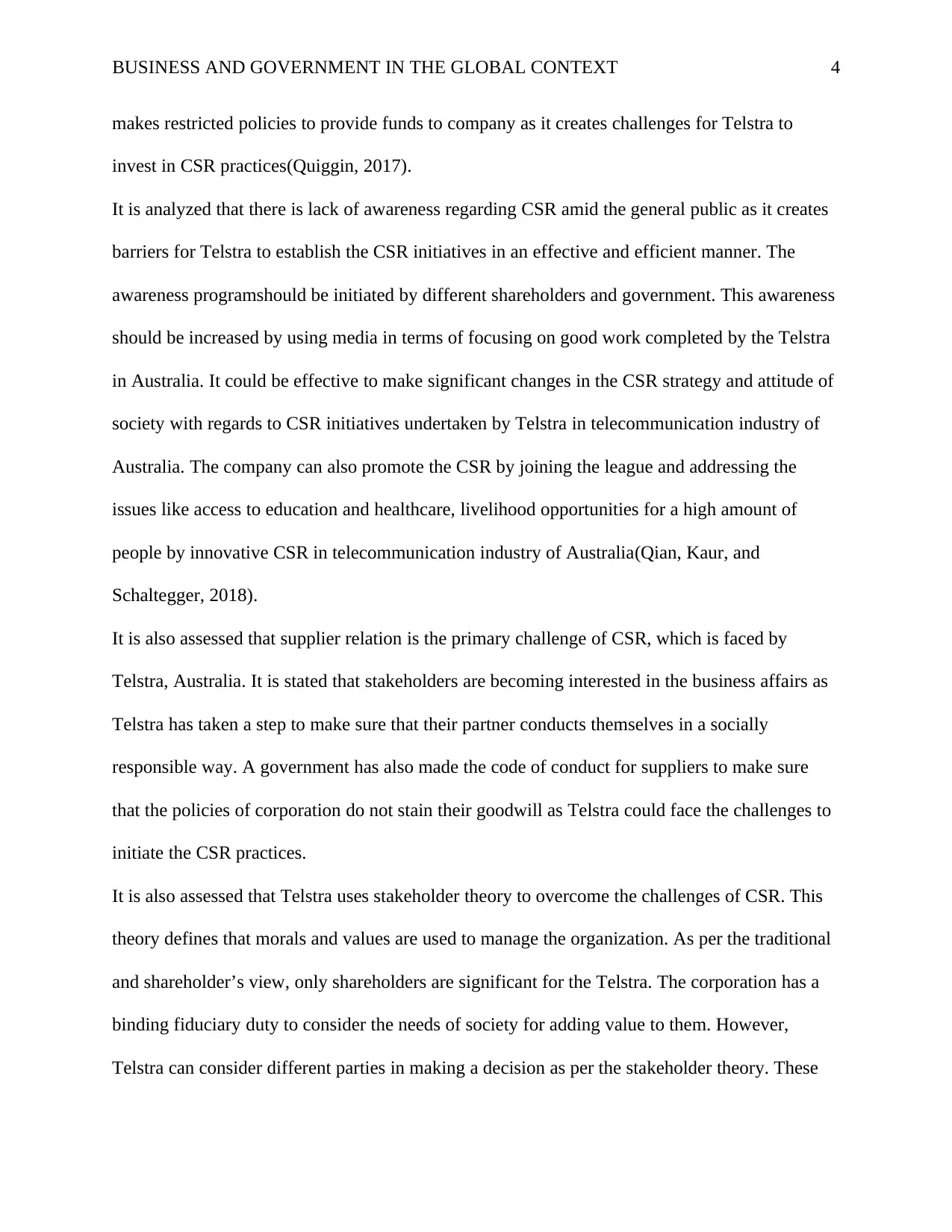
BUSINESS AND GOVERNMENT IN THE GLOBAL CONTEXT 4
makes restricted policies to provide funds to company as it creates challenges for Telstra to
invest in CSR practices(Quiggin, 2017).
It is analyzed that there is lack of awareness regarding CSR amid the general public as it creates
barriers for Telstra to establish the CSR initiatives in an effective and efficient manner. The
awareness programshould be initiated by different shareholders and government. This awareness
should be increased by using media in terms of focusing on good work completed by the Telstra
in Australia. It could be effective to make significant changes in the CSR strategy and attitude of
society with regards to CSR initiatives undertaken by Telstra in telecommunication industry of
Australia. The company can also promote the CSR by joining the league and addressing the
issues like access to education and healthcare, livelihood opportunities for a high amount of
people by innovative CSR in telecommunication industry of Australia(Qian, Kaur, and
Schaltegger, 2018).
It is also assessed that supplier relation is the primary challenge of CSR, which is faced by
Telstra, Australia. It is stated that stakeholders are becoming interested in the business affairs as
Telstra has taken a step to make sure that their partner conducts themselves in a socially
responsible way. A government has also made the code of conduct for suppliers to make sure
that the policies of corporation do not stain their goodwill as Telstra could face the challenges to
initiate the CSR practices.
It is also assessed that Telstra uses stakeholder theory to overcome the challenges of CSR. This
theory defines that morals and values are used to manage the organization. As per the traditional
and shareholder’s view, only shareholders are significant for the Telstra. The corporation has a
binding fiduciary duty to consider the needs of society for adding value to them. However,
Telstra can consider different parties in making a decision as per the stakeholder theory. These
makes restricted policies to provide funds to company as it creates challenges for Telstra to
invest in CSR practices(Quiggin, 2017).
It is analyzed that there is lack of awareness regarding CSR amid the general public as it creates
barriers for Telstra to establish the CSR initiatives in an effective and efficient manner. The
awareness programshould be initiated by different shareholders and government. This awareness
should be increased by using media in terms of focusing on good work completed by the Telstra
in Australia. It could be effective to make significant changes in the CSR strategy and attitude of
society with regards to CSR initiatives undertaken by Telstra in telecommunication industry of
Australia. The company can also promote the CSR by joining the league and addressing the
issues like access to education and healthcare, livelihood opportunities for a high amount of
people by innovative CSR in telecommunication industry of Australia(Qian, Kaur, and
Schaltegger, 2018).
It is also assessed that supplier relation is the primary challenge of CSR, which is faced by
Telstra, Australia. It is stated that stakeholders are becoming interested in the business affairs as
Telstra has taken a step to make sure that their partner conducts themselves in a socially
responsible way. A government has also made the code of conduct for suppliers to make sure
that the policies of corporation do not stain their goodwill as Telstra could face the challenges to
initiate the CSR practices.
It is also assessed that Telstra uses stakeholder theory to overcome the challenges of CSR. This
theory defines that morals and values are used to manage the organization. As per the traditional
and shareholder’s view, only shareholders are significant for the Telstra. The corporation has a
binding fiduciary duty to consider the needs of society for adding value to them. However,
Telstra can consider different parties in making a decision as per the stakeholder theory. These
Paraphrase This Document
Need a fresh take? Get an instant paraphrase of this document with our AI Paraphraser
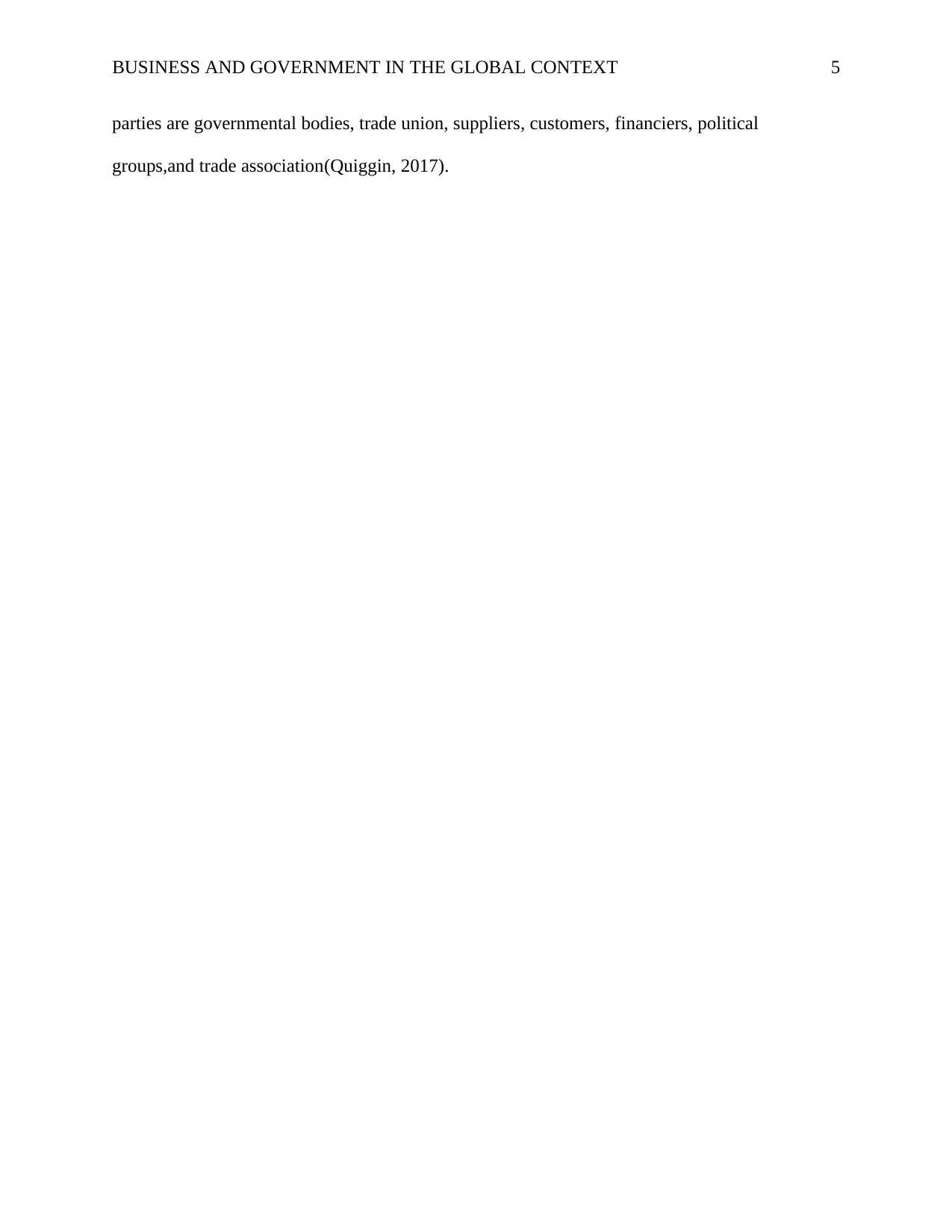
BUSINESS AND GOVERNMENT IN THE GLOBAL CONTEXT 5
parties are governmental bodies, trade union, suppliers, customers, financiers, political
groups,and trade association(Quiggin, 2017).
parties are governmental bodies, trade union, suppliers, customers, financiers, political
groups,and trade association(Quiggin, 2017).
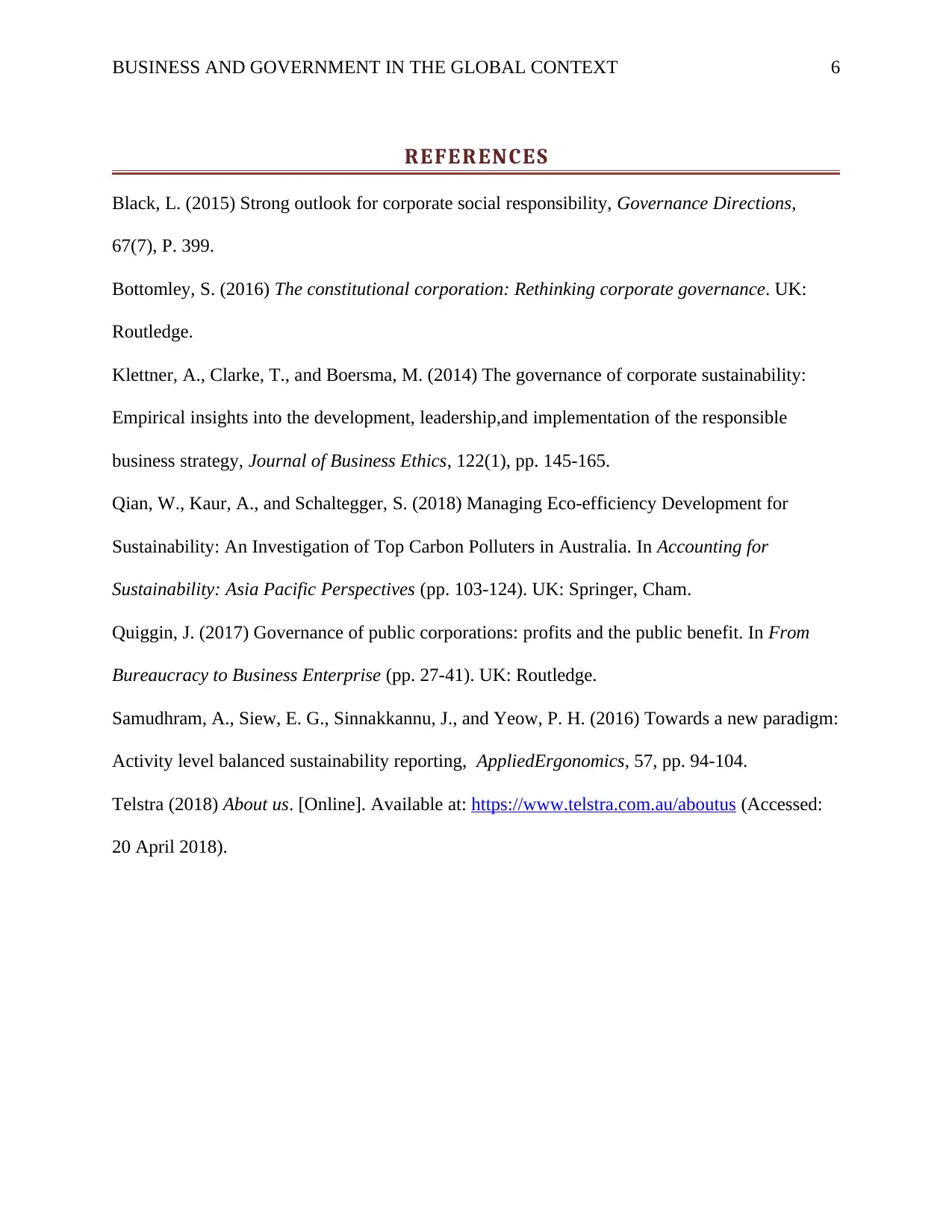
BUSINESS AND GOVERNMENT IN THE GLOBAL CONTEXT 6
REFERENCES
Black, L. (2015) Strong outlook for corporate social responsibility, Governance Directions,
67(7), P. 399.
Bottomley, S. (2016) The constitutional corporation: Rethinking corporate governance. UK:
Routledge.
Klettner, A., Clarke, T., and Boersma, M. (2014) The governance of corporate sustainability:
Empirical insights into the development, leadership,and implementation of the responsible
business strategy, Journal of Business Ethics, 122(1), pp. 145-165.
Qian, W., Kaur, A., and Schaltegger, S. (2018) Managing Eco-efficiency Development for
Sustainability: An Investigation of Top Carbon Polluters in Australia. In Accounting for
Sustainability: Asia Pacific Perspectives (pp. 103-124). UK: Springer, Cham.
Quiggin, J. (2017) Governance of public corporations: profits and the public benefit. In From
Bureaucracy to Business Enterprise (pp. 27-41). UK: Routledge.
Samudhram, A., Siew, E. G., Sinnakkannu, J., and Yeow, P. H. (2016) Towards a new paradigm:
Activity level balanced sustainability reporting, AppliedErgonomics, 57, pp. 94-104.
Telstra (2018) About us. [Online]. Available at: https://www.telstra.com.au/aboutus (Accessed:
20 April 2018).
REFERENCES
Black, L. (2015) Strong outlook for corporate social responsibility, Governance Directions,
67(7), P. 399.
Bottomley, S. (2016) The constitutional corporation: Rethinking corporate governance. UK:
Routledge.
Klettner, A., Clarke, T., and Boersma, M. (2014) The governance of corporate sustainability:
Empirical insights into the development, leadership,and implementation of the responsible
business strategy, Journal of Business Ethics, 122(1), pp. 145-165.
Qian, W., Kaur, A., and Schaltegger, S. (2018) Managing Eco-efficiency Development for
Sustainability: An Investigation of Top Carbon Polluters in Australia. In Accounting for
Sustainability: Asia Pacific Perspectives (pp. 103-124). UK: Springer, Cham.
Quiggin, J. (2017) Governance of public corporations: profits and the public benefit. In From
Bureaucracy to Business Enterprise (pp. 27-41). UK: Routledge.
Samudhram, A., Siew, E. G., Sinnakkannu, J., and Yeow, P. H. (2016) Towards a new paradigm:
Activity level balanced sustainability reporting, AppliedErgonomics, 57, pp. 94-104.
Telstra (2018) About us. [Online]. Available at: https://www.telstra.com.au/aboutus (Accessed:
20 April 2018).
⊘ This is a preview!⊘
Do you want full access?
Subscribe today to unlock all pages.

Trusted by 1+ million students worldwide
1 out of 6
Related Documents
Your All-in-One AI-Powered Toolkit for Academic Success.
+13062052269
info@desklib.com
Available 24*7 on WhatsApp / Email
![[object Object]](/_next/static/media/star-bottom.7253800d.svg)
Unlock your academic potential
Copyright © 2020–2026 A2Z Services. All Rights Reserved. Developed and managed by ZUCOL.





